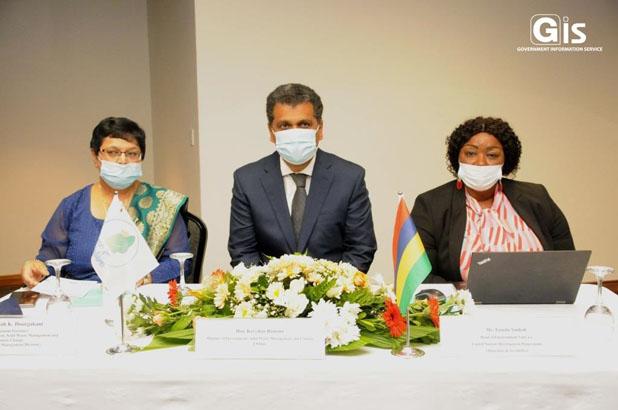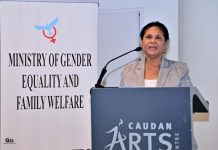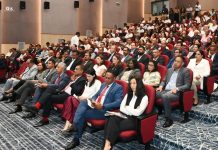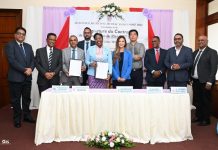Africa-Press – Mauritius. The Solid Waste Division of the Ministry of Environment, Solid Waste Management and Climate Change, in collaboration with the United Nations Development Programme (UNDP), organised, yesterday, at the Caudan Arts Centre in Port Louis, a Validation workshop on the Integrated (Solid and Hazardous) Waste Management Bill for Mauritius.
The event followed the two-day Consultative workshop on the development of an Integrated Waste Management Legislative Framework, held on 8 and 9 February 2022, with the participation of representatives of various ministries, and from the public and private sectors.
These participants gave their views and recommendations which had been transcribed, by the consultants from the UNDP, into a draft legislative framework.
The purpose of the Validation Workshop was for the consultants to present and discuss with stakeholders the main elements of the draft legislative framework, prior to this revised Bill being sent to the State Law Office for vetting.
The Minister of Environment, Solid Waste Management and Climate Change, Mr Kavydass Ramano; the Acting Head of the Environment Unit of UNDP Mauritius and Seychelles, Ms Tanzila Sankoh; and other personalities were present at the opening ceremony of the Validation Workshop.
In his remarks, the Minister recalled that as the Government was moving towards a circular economy model in the solid waste sector, it was crucial to introduce a dedicated legislation in Mauritius that would deal with solid waste management holistically.
Mr Ramano pointed out that the current legislative and regulatory frameworks for solid waste management were not comprehensive, while in some cases, the provisions were outdated leading to a weak enforcement of the laws.
He talked too of the present fragmented and ineffective approach to solid and hazardous waste management due to different Government organisations sharing concurrent jurisdiction over aspects of solid and hazardous waste management.
Underlining that the new Bill would bring all provisions pertaining to solid and hazardous waste under one legal framework, the Minister stated that it would as well provide strategic direction and guidance towards sustainable solid and hazardous waste management practices in line with resource recovery and recycling.
He added that the new legal framework would define the roles and responsibilities of the new Institutional set up that would, not only act as Environmental Protection Regulator, but also ensure that all solid and hazardous waste projects and activities were in line with a common national solid and hazardous waste management strategy and action plan. Minister Ramano also listed other key aspects of the Bill.
These comprised the creation of a National Solid and Hazardous Waste Management Coordination Committee to ensure coordination between relevant Ministries, Local Authorities and parastatal bodies, non-governmental organisations and private sector organisations; the creation of a Technical Advisory Committee to provide technical advice to the Minister on specific aspects of waste management; and the development of national solid and hazardous waste management strategies and action plans ,on a regular basis, in line with circular economy.
According to Mr Ramano, the stakeholders’ contribution to the development of an Integrated (Solid and Hazardous) Waste Management Bill, through their active participation in the consultative and validation workshops, was highly important as it would ensure that the legislation was properly addressing everybody’s need, as far as possible.
For her part, Ms. Tanzila Sankoh, spoke of the need to develop adequate regulatory framework, implement policies and programmes as well as establish enforcement infrastructure so as to achieve environmentally sound management of waste.
For More News And Analysis About Mauritius Follow Africa-Press







